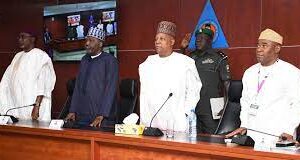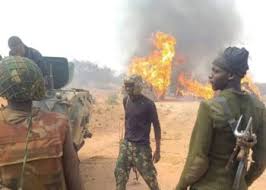The Independent National Electoral Commission (INEC) yesterday insisted that the All Progressives Congress (APC) will not field candidates for the 2019 general elections in Zamfara state.
INEC, had, via a memo to the party, said it would not take candidates from the APC for the Governorship, National Assembly and State House of Assembly elections in the state.
According to the electoral body, the party did not comply with the October 7 guideline for the conclusion of party primaries.
But the APC National Chairman, Comrade Adams Aliyu Oshiomhole countered, saying INEC was wrong, claiming the party not only produced consensus candidate, but still had up till October 18 to submit names of its candidates in the state.
Faulting Oshiomhole’s position, however, a governorship aspirant on the party’s platform, Senator Kabiru Mararafa, said there was no time the party reached consensus on its candidates.
Reiterating the commission’s earlier position, Professor Yakubu said, its earlier stand has not changed.
He spoke yesterday on the sideline of the opening of a two-day validation workshop titled “Study on the cost of elections in ECOWAS Region,” in Abuja.
The workshop followed a study carried out on Benin Republic, Cape Verde, Guinea Bissau.
Liberia, Nigeria and Senegal, to review and validate findings on the increasing cost of conducting elections.
“We have issued a statement on Zamfara and nothing has changed.
We stand by the statement that we issued,” he said.
Yakubu re-emphasised that the deadline for submission of party candidates’ name to the commission was October 18, saying that it would give a full report on that after November 18.
On the Permanent Voter Cards, the INEC boss assured that the PVCs would be made available to all voters who registered this year in November.
“The update is that we have printed the PVCs for those who registered in the first quarter of 2018, and we are simultaneously printing for those who registered in the second and third quarters.
So, we look at the end of November for all the PVCs to be printed,” he assured.
He also said all those who registered and applied for transfer or replacement of their cards will get their PVCs ahead of the 2019 general elections.
On whether there was still room for voter transfer, Yakubu said, “no, we have closed simultaneously as we suspended the registration until after the general election.
But what we are doing is processing the applications we received before the August 31st deadline for the suspension of voter registration.” On cost of elections Speaking on cost of elections in the ECOWAS sub region, Yakubu, who chairs the ECOWAS Network of Electoral Commissions, expressed worry over the rising cost of conducting Elections, saying this has made many countries unable to fund critical aspects of the electoral process as a sovereign responsibility.
According to Yakubu, “the task of meeting such extensive expenditure has increasingly challenged the national resources of many countries in our region.” The INEC boss listed the various elements that contribute to the high cost as follows: “The ever rising cost of voter registration and the compilation of a credible voters’ register, recruitment and training of electoral officials, provision of electoral logistics, election security, civic and voter education, procurement of sensitive and non-sensitive materials, deployment of electoral technology, undertaking regular engagement with stakeholders and handling of preelection and post-election litigations are enormous.” He further noted that “it is against this background that Governing Board of ECONEC inaugurated this study to explore what we can do as Election Managers, working together with national stakeholders and development partners, to find ways to reduce the cost of elections without jettisoning new innovations or compromising the quality, transparency and credibility of elections.” He disclosed that ECONEC had undertaken Needs Assessment, Solidarity and Mid-term Review missions to several member States with a view to sharing experiences amongst the Election Management Bodies (EMBs) in the subregion.
Yakubu also stated that the commissions within ECONEC would share expertise and even pool resources not only with a view to ensuring best practices through peer review, but also in order to reduce the cost of conducting elections among our member states.
He said it was in this spirit of cooperation that Burkina Faso assisted neighbouring Niger Republic with ballot boxes and the printing of the voters’ register for the February 2016 presidential and parliamentary elections.
“Similarly, Ghana provided support to the Republic of Liberia with the printing of the voters’ register for the October 2017 presidential and parliamentary elections.
“Indeed, INEC Nigeria assisted the Republic of Liberia with the deployment of ICT Experts to clean up the disputed voters’ register in order to break the logjam to the conduct of the December 2017 Presidential run-off.
“At a bilateral level, countries within the region have also provided material and technical assistance to one another to support the conduct of credible elections.
“The latest example is Nigeria’s support for the ongoing voter registration exercise in Guinea-Bissau,” Yakubu further stressed, He stated that “even when an election is a sovereign national responsibility, multi-lateral agencies such as the United Nations Development Programme (UNDP) and the European Union (EU), working together with other development partners, have, in some cases, provided support through the donor basket to fund certain electoral expenditure.” He called on Electoral Commissions in the ECOWAS region to rethink the way elections are funded in such a manner as to make the electoral process more costeffective but yet free, fair and credible.
This, according to him, was because of the contending expenditure of government on other aspects of national development.
APC optimistic on Zamfara Meanwhile, the ruling APC has expressed optimism that it would field candidates for all positions in Zamfara state in next year’s elections.
Reacting to INEC’s renewed stand, the new National Publicity Secretary of the party, Mallam Lanre Issa-Onilu, said the party will meet all requirements for submission of candidates from the state.
He said: “INEC cannot say that we don’t have candidates for election until the deadline has expired.
We have options of consensus, direct and indirect primaries and we are going to apply like we have done in other states, our energies, time and concerns, to pick our candidates.
“I can assure you that before the October 18 deadline, we are going to meet all INEC requirements and we are going to submit names of all the candidates for not Zamfara state, but all the 36 states and the FCT.” The party’s spokesman also dismissed the suggestion that APC might sue INEC, saying: “It is not yet something for the party to take legal action, nothing calls for that.
We would not be reacting to what INEC said in the public.” He explained that after the party got a letter from the INEC, it replied it but was yet to receive a reply from the commission.
“We are on the side of the law; we had a primary in Zamfara state.
We are operating within the guidelines of INEC and the constitution of the Federal Republic Nigeria.
We believe that INEC does not have the correct information on what happened in Zamfara, and this we have stated in our letter to the commission.
“They haven’t replied our letter, so we take it that the matter remains as it is.
We also ask INEC that if they need more information from us, that we will be ready to offer it,” Issa-Onilu further added.
He further noted that “as an umpire you don’t give the result of a game that is ongoing.
We still have up till October 18th to submit list of candidates for the election.” 6.6m eligible Lagos voters In a related development, the INEC has disclosed that Lagos state boasts of 6,609,115 eligible voters during the 2019 general elections in the state.
Resident Electoral Commissioner, Sam Olumekun, disclosed this at a workshop on Lagos State Election Security Strategic Plan for 2019 Elections.
The News Agency of Nigeria (NAN) reports that the workshop was organised by Nigeria Policing Programme (NPP) in collaboration with INEC.
The Administrative Secretary of the commission, Adelani Asade, delivered Mr.
Olumekun’s speech at the workshop.
Lagos state has 245 registration areas (wards), 8,462 polling units, and 3669 voting points across the 20 local governments of the state.
Olumekun agreed that security is key to holding a successful election.
“6,609,115 eligible Nigerians registered to vote during the 2019 general elections in the state.
“I am profoundly grateful to NPP for organising this very important and timely workshop on elections security considering the role of good security structure in conducting a peaceful and successful general elections in 2019.
“It is crucial to say that with 91 political parties and about 74 million voters geared to take informed decision and action at the general elections in 2019, the security of election officials, materials, and the electorate is of utmost importance to the commission.
“Indeed, security is key to the conduct of credible elections.
INEC in Lagos is truly proud of partnering with NPP at this most auspicious time in the electoral cycle,” Olumekun said.
The INEC commissioner commended the NPP and hoped that the workshop would give the commission the opportunity to review, reflect, brainstorm, and re-engineer its security structure and strategy.
He added that the commission’s proactiveness on security, had informed regular meeting of the Inter-Agency Consultative Committee on Election security where matters concerning security before, during and after elections were discussed.
Olumekun said INEC would improve on the conduct of elections in 2019.
In his goodwill message, the representative of NPP, Emeka Ukaotu said that INEC would need to develop its election security management plan.
According to him, some factors needed to be considered by INEC in developing the plan.
These include relevant intelligence and information about locations and assessment of vulnerability.
He urged INEC to also consider previous history of electoral offences or allegations associated with the geographical area.
Ukaotu said the commission should also consider the potential for offences to be committed as a result of lack of policing, ill-prepared local authority, complacency and political culture.
NAN reports that some of the topics at the three-day workshop included; Importance of Security Threat Analysis in Strategic Planning and “Identification and Mapping of Peculiar Election Security Threats Across Lagos”



